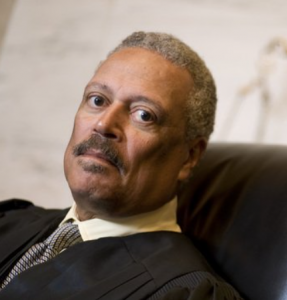Judge Emmett Sullivan dismissed the criminal case for President Trump's former National Security Advisor, General Michael Flynn on Tuesday, just a few weeks after President Trump's "full and unconditional pardon" on Nov. 25. After issuing the pardon, Trump said in a later statement that Flynn should never have been prosecuted. The Department of Justice (DOJ) had dismissed his case on June 17, 2020.
The Sullivan opinion came after three-plus years of grueling litigation and great hardship to the Flynn family. Flynn hired Lawyer Sidney Powell in December of 2018. Sullivan refused to drop the case after the DOJ dismissed it in June.
 Photo by Diego M. Radzinschi/NLJ
Photo by Diego M. Radzinschi/NLJ
Sullivan's dismissal was not without caveat, however. He said that "A pardon does not necessarily render innocent a defendant of any alleged violation of law." He added that President Trump's pardon was "broad" and was a "political decision, not a legal one." Sullivan also made it clear that the reason he was dismissing the case is because the pardon rendered it "moot" and “does not, standing alone, render [Flynn] innocent of the alleged violation.”
The U.S. Court of Appeals for the D.C. Circuit had, in August, affirmed that Judge Sullivan was not required to dismiss the case.
Flynn was fired by Trump in February 2017 for allegedly lying to Vice President Mike Pence about presidential transition calls with then Russian Ambassador Sergey Kislyak. Many said the calls violated the Logan Act but, in fact, it was found that he was doing nothing other than the standard duties of a man performing his role during the Trump administration's transition into office. He pleaded guilty for allegedly lying to FBI agents but later withdrew his plea. The investigation lead by the FBI and Special Counsel Mueller came to be known as Crossfire Hurricane and Flynn's code name was Crossfire Razor. A letter, written by General Flynn describes events during the time he was represented by Covington & Burling and his frame of mind at the time:
"I used words and phrases that were not really my own voice, and I regret that—just as I regret pleading guilty. People think that a 3-star general must know everything but I was a fish out of water in a terrifying and completely foreign situation with none of the legal skills necessary to deal with the many things being thrown at me. One of the ways a person becomes a 3-star general is by being a good soldier, taking orders, being part of a team and trusting the people who provide information and support . . . I should have stood my ground for what I knew to be the truth, that I did not lie to agents . . . and that I needed to consult new counsel."
Flynn had cooperated with agents like Peter Stzrok who failed to notify him that he was being investigated. Even former FBI Director, James Comey, bragged about violating FBI policy to ambush Flynn. General Flynn had trusted both the government he served and the Covington law firm. He came to realize, however, that neither one was working to "protect his interests first."
He had been advised at the time to plead guilty by his law firm and was told that if he did not plead, he would "be indicted on multiple counts" and that his son would also face indictment. His attorneys told him that he was looking at the "potential of 15 years in prison," and that he would be "subjected to the Manafort treatment."
There is speculation that the Obama administration had targeted Flynn because Obama saw him as a threat to his legacy, rooted in his July 2015 nuclear deal with Iran. Journalist Lee Smith recounted that Flynn had said that it was a catastrophe to realign American interests with those of a terror state, long before his alliance with Trump. And, in fact, during the Trump transition, there were only two people that Obama warned President Trump to stay away from: North Korean President Kim Jong Un and General Michael Flynn.
During the time that Powell was handling the Flynn case, many documents surfaced that confirmed bias, illegal leaking of Flynn phone calls, and targeting of Flynn and his son. Documents confirmed evidence of perjury traps laid by FBI agents to get him to lie "so we can prosecute or get him fired."
Judge Sullivan's dismissal of the Flynn case lays to rest a sordid chapter in American history—the story of the unjust treatment of an innocent man that should never be repeated.


